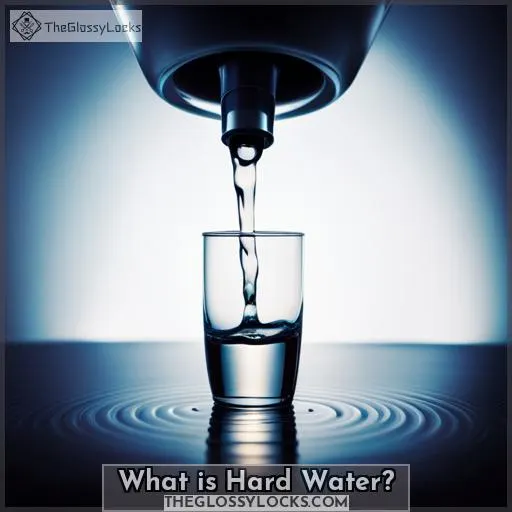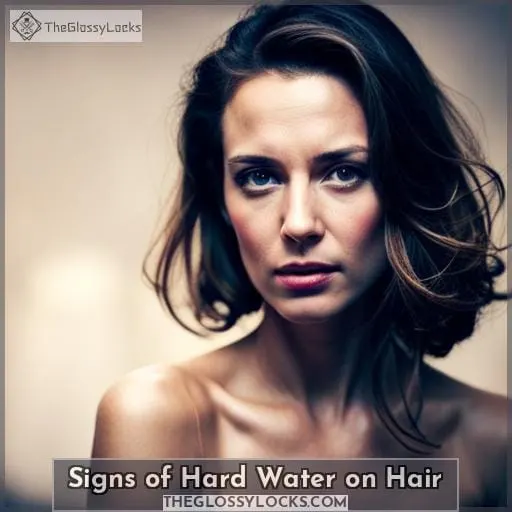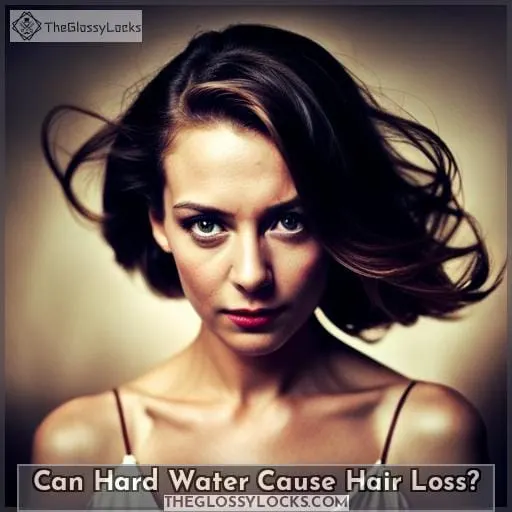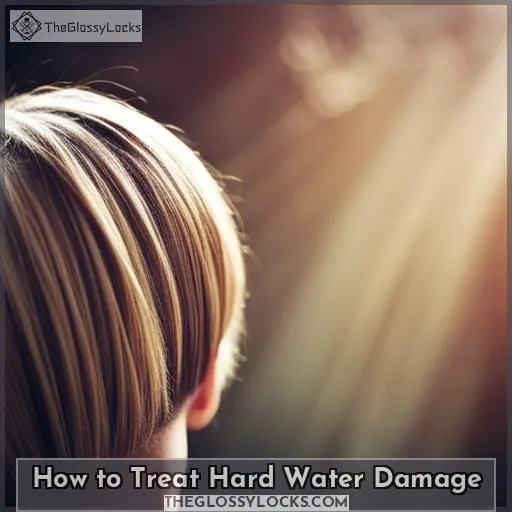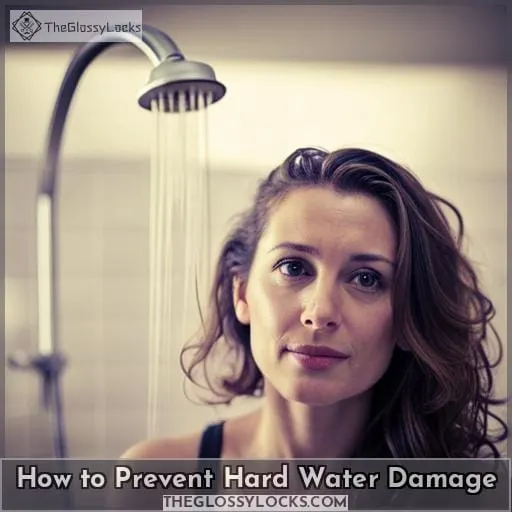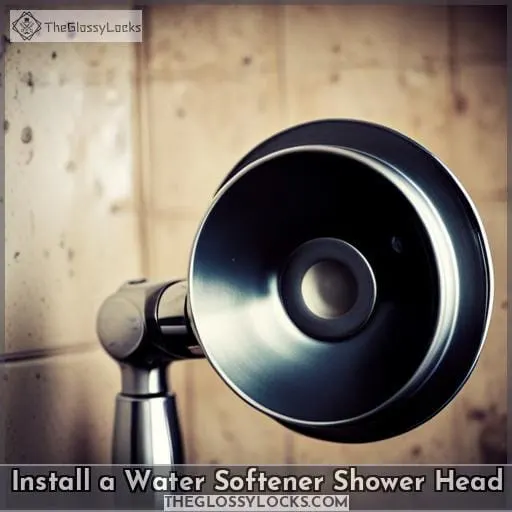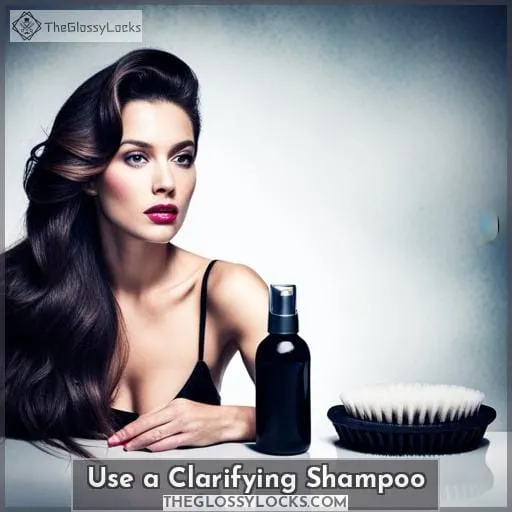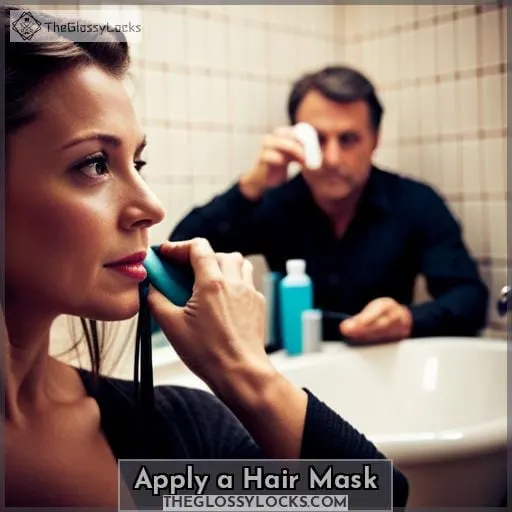This site is supported by our readers. We may earn a commission, at no cost to you, if you purchase through links.
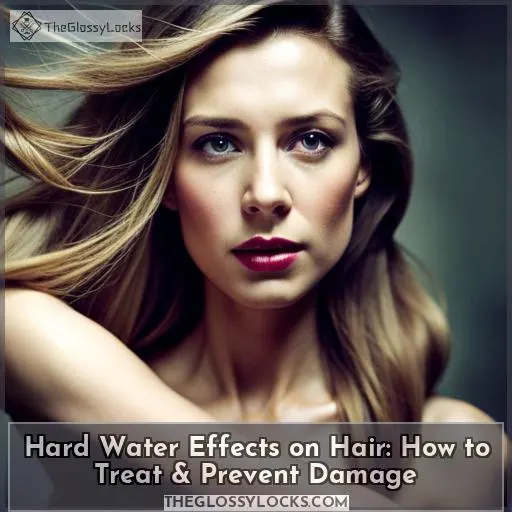 Hard water can wreak havoc on your hair, leaving it dry, brittle, and prone to breakage.
Hard water can wreak havoc on your hair, leaving it dry, brittle, and prone to breakage.
- Signs of hard water damage:
- Your hair feels dry and brittle
- Your hair is more prone to breakage
- Your hair has a dull, lifeless appearance
- Your hair is difficult to style
- How to treat hard water damage:
- Use a clarifying shampoo to remove mineral buildup from your hair
- Use a conditioner that is designed for dry, damaged hair and incorporates nourishing ingredients like argan oil and aloe vera found in best conditioners for dry hair
- Deep condition your hair regularly
- Avoid using hot water on your hair
- Use a leave-in conditioner to protect your hair from the elements
- How to prevent hard water damage:
- Install a water softener in your home
- Use a shower filter
- Rinse your hair with filtered or bottled water after showering
- Dry your hair with a cool air setting
Table Of Contents
- Key Takeaways
- What is Hard Water?
- Signs of Hard Water on Hair
- Can Hard Water Cause Hair Loss?
- How to Treat Hard Water Damage
- How to Prevent Hard Water Damage
- Short-term Issues May Turn Into Long-term Problems
- Install a Water Softener Shower Head
- Use a Clarifying Shampoo
- Apply a Hair Mask
- Frequently Asked Questions (FAQs)
- Conclusion
Key Takeaways
- Hard water can strip moisture from your hair, making it dry and brittle.
- Hard water can also cause your hair to become frizzy and difficult to manage.
- The long-term effects of hard water damage can include dry, brittle, and damaged hair that is more prone to breakage.
- There are a number of ways to treat and prevent hard water damage, including using a clarifying shampoo, conditioner, and deep conditioner.
What is Hard Water?
Hard water is water with a high mineral content, which can make your hair dry, brittle, and frizzy.
The minerals in hard water can bind to the hair shaft, making it difficult for moisture to penetrate.
Additionally, hard water can also cause your hair to appear dull and lifeless.
If you have hard water, there are a few things you can do to help protect your hair from damage.
First, you can use a clarifying shampoo to remove the minerals from your hair.
You can also use a hair mask or conditioner to help hydrate your hair and restore its shine.
Finally, you can install a water softener in your home to reduce the amount of minerals in your water.
Signs of Hard Water on Hair
Blonde hair can start appearing anywhere from green-toned to brassy or metallic due to hard water. Hard water can also make your hair dry, brittle, and more frizzy. You may also notice that your hair is more prone to tangles and breakage.
If you suspect that your hair is damaged by hard water, there are a number of things you can do to treat and prevent the damage.
Can Hard Water Cause Hair Loss?
Hard water can make hair dry, brittle, and more frizzy, which can all contribute to hair loss.
Here are 3 ways hard water can cause hair loss:
- Hard water mineral buildup can weigh down hair and make it appear thinner.
- Hard water can strip hair of its natural oils, making it more prone to breakage.
- Hard water can make hair more difficult to style, which can lead to damage and breakage.
If you think your hair is being damaged by hard water, there are a number of things you can do to treat and prevent the damage.
First, try using a clarifying shampoo to remove mineral buildup.
Second, use a hair mask to help repair damaged hair.
Third, invest in a water softener shower head to reduce the amount of minerals in your water.
How to Treat Hard Water Damage
There are a number of things you can do to treat hard water damage, including:
- Using a clarifying shampoo to remove mineral buildup.
- Applying a hair mask to help repair damaged hair.
- Trying a citrus and vinegar rinse to help restore your hair’s pH balance.
Clarifying Shampoos
To treat hard water damage, you can use a clarifying shampoo to remove mineral buildup.
Clarifying shampoos are designed to deep clean the hair and scalp, and they can help to restore your hair’s natural pH balance.
Hair Masks
Hair masks can help to repair damaged hair by providing deep hydration and nourishment.
Look for masks that contain moisturizing ingredients like honey, aloe vera, or coconut oil.
Apply the mask to your hair after shampooing and leave it on for 10-20 minutes.
Rinse thoroughly and follow with a conditioner.
Citrus and Vinegar Rinse
Try a citrus and vinegar rinse to help restore your hair’s pH balance and remove mineral buildup.
- Restores pH balance
- Removes mineral buildup
- Helps to detangle hair
- Adds shine
How to Prevent Hard Water Damage
To prevent hard water damage, you can use:
- A water softener shower head
- Sulfate-free shampoo
- Rinse your hair in the direction of your natural growth
- Finish your shower with cold water.
Water Softener Shower Head
Installing a water softener shower head is an effective way to prevent hard water damage to your hair.
Water Softener Shower Head
| Pros | Cons |
|---|---|
| Reduces mineral buildup | More expensive than a regular shower head |
| Helps hair retain moisture | May require professional installation |
| Makes hair easier to style |
Sulfate-Free Shampoo
Using a sulfate-free shampoo is one of the best ways to prevent hard water damage to your hair.
Sulfate-free shampoos are specifically formulated without sulfates, which can strip the hair of its natural oils and further exacerbate dryness caused by hard water.
These shampoos provide gentle cleansing while maintaining the moisture balance in your hair, preventing it from becoming dry, brittle, and difficult to manage.
Many brands offer sulfate-free options with positive reviews for their effectiveness in protecting against hard water damage.
Rinsing Hair in the Direction of Growth
To prevent hard water damage, rinse your hair in the direction of its natural growth.
This will help to prevent tangles, reduce frizz, and improve shine.
Finishing Your Shower With Cold Water
Finishing your shower with cold water:
- Closes the cuticle
- Helps with styling
- Reduces frizz
- Prevents damage
- Improves shine
Short-term Issues May Turn Into Long-term Problems
As you continue to experience the effects of hard water on your hair, it’s important to recognize that what may initially seem like short-term issues can actually turn into long-term problems if left untreated.
Dry and brittle hair, for example, can be a result of mineral buildup caused by hard water. This mineral buildup not only makes your hair more prone to breakage but also increases the likelihood of experiencing hair loss over time.
Furthermore, frizzy and brassy hair are common consequences of prolonged exposure to hard water. The minerals in the water can strip away moisture from your strands, leaving them dry and difficult to manage.
Additionally, dull and lifeless-looking locks are often a direct result of hard water’s impact on your tresses.
In addition to these cosmetic concerns, tangled hair and dry scalp are other long-term problems associated with hard water damage. The mineral deposits present in this type of water make it harder for products such as conditioners or oils to penetrate properly into the scalp or along each strand.
To prevent these short-term issues from turning into long-lasting damage, consider investing in a high-quality shower filter that effectively removes contaminants and minerals found in tapwater. By taking proactive steps now, you’ll ensure that your luscious locks remain healthy, vibrant, and manageable well into the future.
Install a Water Softener Shower Head
If short-term issues aren’t dealt with, they can turn into long-term problems, so installing a water softener shower head can help prevent hard water damage.
- Softer water: A water softener shower head removes minerals from your water, leaving you with softer, smoother water that’s less likely to damage your hair.
- Less frizz: Hard water can make your hair frizzy and difficult to style. A water softener shower head can help reduce frizz by removing the minerals that cause it.
- Shinier hair: Hard water can make your hair dull and lifeless. A water softener shower head can help restore your hair’s shine by removing the minerals that dull it.
- Less breakage: Hard water can make your hair more prone to breakage. A water softener shower head can help reduce breakage by removing the minerals that weaken your hair.
Installing a water softener shower head is a simple and affordable way to protect your hair from the damaging effects of hard water.
Use a Clarifying Shampoo
After installing a water softener shower head, you can use a clarifying shampoo to remove any remaining mineral buildup from your hair.
Clarifying shampoos are designed to deep clean your hair and scalp, and they often contain ingredients like sulfates, alpha hydroxy acids, and clays.
Clarifying shampoos can be used on a weekly or biweekly basis, depending on your hair type and needs.
If you have color-treated hair, be sure to use a clarifying shampoo that’s specifically formulated for color-treated hair.
Clarifying shampoos can help to remove build-up from your hair and scalp, and they can also help to improve the condition of your hair.
Apply a Hair Mask
Following up with a hair mask will help to further nourish and repair your hair after using a clarifying shampoo.
There are many different types of hair masks available, so you can choose one that’s tailored to your specific hair type and needs.
Some common ingredients found in hair masks include oils, butters, proteins, and humectants.
Oils and butters help to moisturize and protect the hair, while proteins help to strengthen and repair damaged hair. Humectants help to draw moisture to the hair, keeping it hydrated.
To apply a hair mask, first shampoo your hair as usual. Then, apply a generous amount of the mask to your hair, avoiding the scalp. Leave the mask on for the recommended amount of time, then rinse it out thoroughly.
You can use a hair mask once or twice a week, depending on your hair type and needs.
Hair masks can provide a number of benefits for your hair, including increasing hair softness and hydration
- Moisturizing and hydrating the hair
- Strengthening and repairing damaged hair
- Protecting the hair from heat and styling damage
- Reducing frizz and flyaways
- Adding shine and volume to the hair
If you’re looking for a way to improve the health and appearance of your hair, consider using a hair mask.
Frequently Asked Questions (FAQs)
What are the long-term effects of hard water on hair?
Long-term effects of hard water on hair include:
- Dry, brittle, and damaged hair that’s more prone to breakage.
You can treat hard water damage by:
- Using a clarifying shampoo.
- Applying a hair mask.
- Rinsing your hair with a citrus and vinegar rinse.
Can hard water damage hair that is already damaged?
Yes, hard water can damage hair that’s already damaged.
The minerals in hard water can strip the hair of its natural oils, making it dry and brittle.
What are the best products to use for hard water hair?
The best products to use for hard water hair are those that are designed to combat mineral buildup and moisturize the hair, as staying hydrated and drinking enough water creates a healthy environment for hair growth and improves hydration levels. The best products to use for hard water hair are those that are
- Sulfate-free
- Clarifying
- Moisturizing
These products will help to:
- Remove mineral buildup
- Restore your hair’s pH balance
- Keep your hair healthy and hydrated
How can I tell if my hair is damaged by hard water?
You may have hard water damaged hair if it’s:
- Dry
- Brittle
- Tangled
- Has a brassy or green hue.
You can also test your water hardness by using a water hardness test kit.
What are some other ways to prevent hard water damage to hair?
To prevent hard water damage to your hair:
- Use a sulfate-free shampoo.
- Rinse your hair in the direction of your natural growth.
- Finish your shower or bath with cold water.
Conclusion
Don’t let hard water wreak havoc on your hair.
By following these tips, you can treat and prevent hard water damage and keep your hair looking its best.

